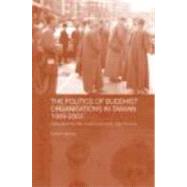- ISBN: 9780415322355 | 0415322359
- Cover: Hardcover
- Copyright: 10/28/2004
The Politics of Buddhist Organizations in Taiwanlooks at a relatively unexplored aspect of modern Taiwan: the influence of religion on politics. Although much has been written on the contribution of Christian churches to the debates on self-determination and democratic tradition on the island, we know less about the political influence on Buddhist organizations, which claim together to attract over four million adherents. These organizations exercise considerable influence in Taiwanese society and yet their stand on relations across the Taiwan Strait, communal harmony, economic and political liberalization, as well as the creation of a welfare State, remains largely unexplored. Laliberte demonstrates that Taiwanese Buddhists are not a monolithic bloc, and that the organizations that represent them reflect in their diversity the complexity and pluralism of the society in which they have evolved. This book offers a detailed survey of three of the most important Buddhist organizations in Taiwan:the Buddhist Association of the Republic of China (BAROC), the Buddha Light Mountain (or Foguanshan) monastic order, and the Buddhist Compassion Relief Tzu Chi Association (or Ciji). It examines their contrasting approaches to three issues: state supervision of religion, the first presidential election of 1996, and the establishment of the National Health Insurance. This study analyses the factors that explain the diverse paths the three organizations have taken in the politics of Taiwan. It reveals that despite a shared theological background, individual religious leaders interpret their tradition very differently when they believe it constrains the development of their organizations and the fulfilling of its goals. Based on an in-depth examination of Buddhist leaders' behavior,The Politics of Buddhist Organizations in Taiwancompels us to question conventional views about the allegedly passive aspect of religious tradition, deference to authority in societies influenced by Confucian cultureand the adverse legacy of authoritarian regimes.







